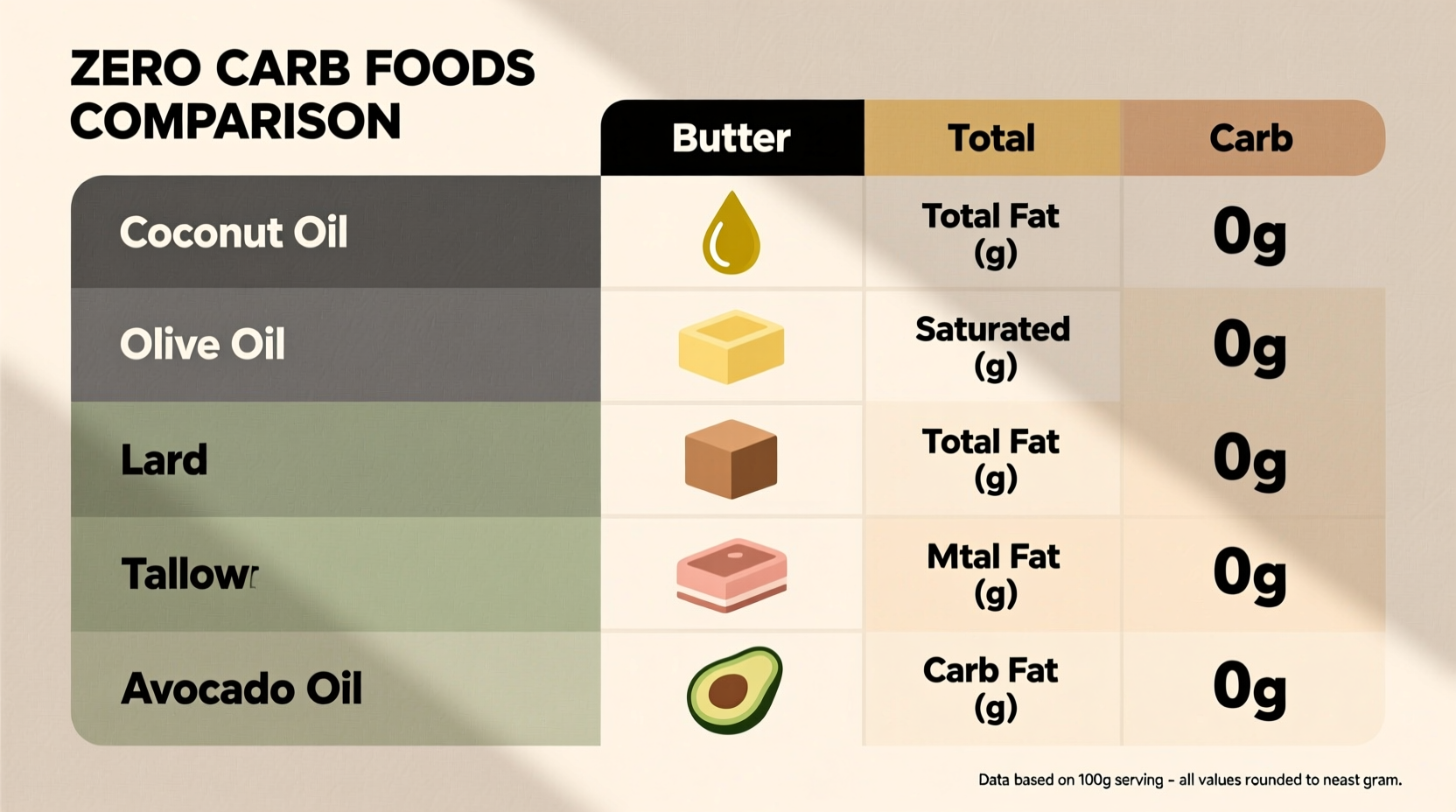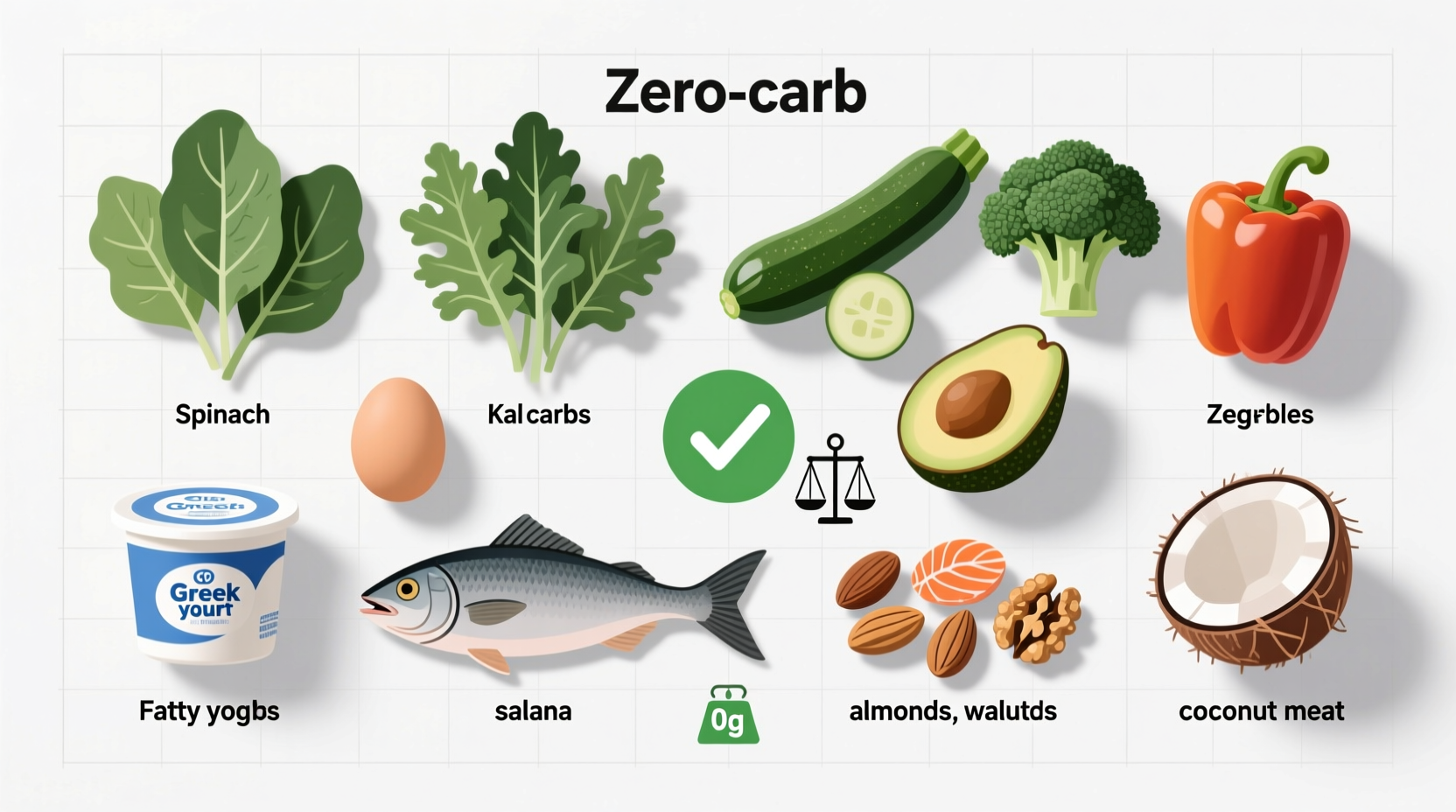If you're searching for what foods have 0 carbs, the direct answer is: pure animal fats, certain oils, and water contain zero carbohydrates. No whole plant foods are truly carb-free, though some like celery and cucumbers have negligible amounts (under 1g per serving). Understanding which foods genuinely contain zero carbs is essential for keto diets, diabetes management, and specific medical conditions.
The Science Behind Zero-Carb Foods: What You Need to Know First
When exploring what foods have 0 carbs, it's crucial to understand nutritional science basics. True zero-carb foods contain absolutely no carbohydrates—not even trace amounts. Many websites mistakenly list foods as "zero carb" when they actually contain minimal carbs (1g or less per serving).
According to USDA FoodData Central, only specific categories qualify as genuinely zero-carb:
- Pure fats and oils (coconut oil, olive oil, avocado oil)
- Animal fats (butter, lard, tallow)
- Water and unsweetened beverages
- Plain coffee and tea (without additives)
- Most spices in small quantities
Even eggs, commonly thought to be zero-carb, contain about 0.6g of carbs per large egg according to the USDA National Nutrient Database. This distinction matters significantly for strict ketogenic diets where every gram counts.
Zero-Carb Food Categories: What Actually Qualifies
| Food Category | Truly Zero-Carb? | Common Misconceptions | Important Considerations |
|---|---|---|---|
| Animal Fats | Yes (butter, tallow, lard) | Cheese often contains carbs | Clarified butter (ghee) remains zero-carb |
| Oils | Yes (all pure oils) | "Zero carb" flavored oils may contain sugars | Check labels for additives |
| Meat & Poultry | No (trace carbs present) | "Zero carb" claims for meats | Typically 0-1g per 3oz serving |
| Seafood | No (trace carbs) | Fish considered completely carb-free | Shellfish contain slightly more carbs |
| Eggs | No | Commonly listed as zero-carb | 0.6g carbs per large egg |
| Water & Beverages | Yes (plain versions) | Flavored waters contain carbs | Check for hidden sweeteners |
Why Most "Zero Carb" Claims Are Misleading
The nutrition label regulations allow foods with less than 1g of carbs per serving to be labeled as "0g carbs"—this doesn't mean they're truly carb-free. For those following strict ketogenic diets (typically under 20g carbs daily), these small amounts can accumulate quickly.
Consider this context boundary: a medical patient requiring near-zero carb intake for therapeutic reasons versus someone casually following a low-carb diet have vastly different needs. The National Institutes of Health notes that "trace carbohydrates in otherwise 'zero-carb' foods become clinically significant when consumed in large quantities or by individuals with specific metabolic conditions."
Practical Zero-Carb Food Choices for Your Diet
When building meals around zero-carb foods, focus on these practical options:
Fats and Oils That Deliver Zero Carbs
- Extra virgin olive oil - perfect for dressings
- Coconut oil - ideal for high-heat cooking
- Avocado oil - neutral flavor for various applications
- Grass-fed butter - adds richness to dishes
- Ghee (clarified butter) - lactose-free option
Beverages With Absolutely No Carbs
- Plain water (still or sparkling)
- Black coffee (no sugar or milk)
- Plain tea (green, black, herbal)
- Vinegar-based drinks (like straight apple cider vinegar diluted in water)
Remember that while these options contain zero carbs, they should be consumed as part of a balanced approach. The Academy of Nutrition and Dietetics emphasizes that "excluding all carbohydrate-containing foods long-term may lead to nutrient deficiencies unless carefully planned with professional guidance."

Common Zero-Carb Myths Debunked
Let's address some persistent misconceptions about what foods have 0 carbs:
Myth: All Meat Is Completely Carb-Free
While meat contains minimal carbs, it's not technically zero. Processed meats often contain added sugars or fillers that increase carb content. Always check labels for "what foods have 0 carbs" when selecting packaged products.
Myth: Eggs Contain No Carbohydrates
According to USDA data, a large egg contains approximately 0.6g of carbohydrates. While this is negligible for most people, it matters for those tracking every gram.
Myth: All Spices Are Zero-Carb
Most spices contain minimal carbs, but in larger quantities they add up. For example, one tablespoon of ground cinnamon contains about 8g of carbs. When exploring what foods have 0 carbs, remember that spice quantities matter.
Putting Zero-Carb Foods Into Practice
For those following extremely low-carb diets, here's how to effectively incorporate truly zero-carb foods:
Meal Planning Tips
- Use oils as primary cooking mediums instead of breading or flour-based coatings
- Create dressings from pure oils and vinegars
- Choose water or plain tea instead of flavored beverages
- When seasoning meats, verify no sugar-containing rubs are used
- Track even trace carbs if following a medical ketogenic protocol
Daily Carb Budget Considerations
Understanding what foods have 0 carbs helps allocate your limited carb budget to nutrient-dense vegetables and other beneficial foods. For example, if you're limited to 20g carbs daily, knowing that your cooking oil and beverages contribute zero carbs allows you to use those precious grams on leafy greens and low-starch vegetables.
The Centers for Disease Control and Prevention notes that "individual carbohydrate tolerance varies significantly based on activity level, metabolic health, and personal health goals." This explains why some people thrive on very low-carb diets while others don't.
Important Considerations Before Going Zero-Carb
While exploring what foods have 0 carbs, consider these important factors:
- Long-term zero-carb diets may lead to nutrient deficiencies
- Some people experience electrolyte imbalances on extremely low-carb diets
- Individual responses to carb restriction vary significantly
- Medical supervision is recommended for therapeutic ketogenic diets
- Most nutrition experts recommend including some low-carb vegetables for fiber and micronutrients
As noted in research published in the American Journal of Clinical Nutrition, "complete elimination of dietary carbohydrates is unnecessary for most health goals and may compromise long-term dietary adherence and nutritional adequacy."
Your Zero-Carb Food Journey Starts Here
Understanding exactly what foods have 0 carbs empowers you to make informed dietary choices whether you're managing diabetes, following a ketogenic diet, or addressing specific health concerns. Remember that while truly zero-carb options are limited, strategically using these foods creates room in your carb budget for nutrient-dense vegetables and other beneficial foods.
For most people, the goal shouldn't be complete carb elimination but rather thoughtful carb selection. Focus on whole, unprocessed foods and consult with a healthcare provider before making significant dietary changes—especially if you have underlying health conditions.











 浙公网安备
33010002000092号
浙公网安备
33010002000092号 浙B2-20120091-4
浙B2-20120091-4